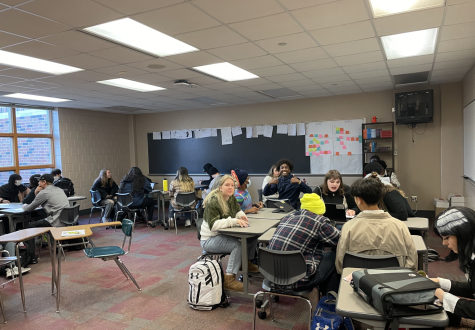Federal government avoids education problems
January 30, 2016
It is clear that throughout America’s history, education has been important to the future of society as Ben Franklin, a Founding Father, suggests, “Genius without education is like silver in the mine.” However, the government’s role in education has been at constant debate and fluctuated greatly. On Dec. 10, the federal government changed their role in education dramatically as the Every Student Succeeds Act (ESSA) was signed into a law. This act was an all around A+ and deserved to be turned into a law.
This act is a rewritten and up-to date version of the current No Child Left Behind Act (NCLB) that was put into action in 2002. While both are about the government’s role in education, the new ESSA has two major differences. The first difference is that the state government will now be more in control of the educational system within their state whereas before, the federal government used to head the system. The second difference is that under the ESSA, schools and their faculty would be evaluated not just on the results of standardized tests, but other factors as well.
Evaluation of Schools and Students
In the ESSA, factors other than test scores will be used to evaluate a school’s performance. These factors could be dropout rates, completion of an Advanced Placement class or more, but “should be used in lieu of, or in conjunction with, testing. These, to us, are truer measures of how well students are doing in the classroom,” Clay Robison, a spokesman for the Texas State Teachers Association, said during a hearing on the act.
These new factors on how to evaluate schools in the ESSA will allow schools to see the whole picture and assess the situation better. This is because standardized tests do not directly impact students while their GPA, class choices and diplomas do. Also when a school does poorly on their standardized tests, they will not be hindered as greatly in a financial sense and will be able to quickly come up with a solution on how to better prepare their students.
In an interview Senator Lamar Alexander explained, “The backlash to Washington trying to tell 100,000 schools too much about what they should be doing caused people on both the left and the right to remember that the path to higher standards and better teaching and real accountability is community by community, classroom by classroom, state by state, and not through the federal government dictating the solution.”
The problem with the old NCLB is that it was too general. With the ESSA passed, states, communities and classrooms will be better able to teach their students because they will be able to have a more personalized teaching strategy. This more personalization will be better because the teachers will use their time more wisely and focus on things that the student needs.
At the signing ceremony for the ESSA, President Barack Obama said, “With this bill, we reaffirm that fundamental American ideal that every child — regardless of race, income, background, the ZIP code where they live — deserves the chance to make out of their lives what they will.”
My experience is that finding a way to fairly reward better teaching is the holy grail of K-12 education. But Washington will get the best long-term result by creating an environment in which states and communities are encouraged, not ordered, to evaluate teachers
— Lamar Alexander
Due to the new ESSA, funding will be more lenient and therefore allow schools to worry less about test scores. This allows schools to focus on helping kids learn. This is a great result because schools now, more than ever, will be able to focus on diminishing the achievement gaps between people of different races, income, background and more while not having to worry about their possible lower test scores that used to bring about fiscal punishments.
Teacher Evaluations
Not only are students evaluated in the school, but teachers are as well. With the new ESSA law however, teacher evaluations will be changed. As Alexander explained, “My experience is that finding a way to fairly reward better teaching is the holy grail of K-12 education. But Washington will get the best long-term result by creating an environment in which states and communities are encouraged, not ordered, to evaluate teachers.”
The new teacher evaluations under the ESSA would be beneficial because teachers would not be focused on administering tests to better reflect their performance. This would have lasting effects on students because they would be solely focused on the idea of learning, and not be interrupted by standardized tests. This could lead to a better student teacher relationship, as the student and teacher both learn together and have a joint objective to better the student’s future.
Proponents of the other side think that the proposed ESSA is flawed due to various state’s lack of discipline, motivation and adequate resources to evaluate the student and teacher performance. The indicators of poor performing schools and unqualified teachers will not be taken into consideration and given the emphasis needed. Ultimately, the needed actions and accountability will not occur. Despite these views, those who see the ESSA as problematic are simply uninformed about the role that states’ governments have already taken in education. Also under the ESSA now, states will be able to evaluate and resource schools based on broader criteria better reflecting individual school’s needs thus positively impacting more students in a unique way.
Society keeps evolving and adapting with new ideas and technologies as a byproduct, but education is ultimately at the root of all of this. Thus it should keep pace with the change and reflect what’s going on around the core of learning. The ESSA is the solution to all of this and will certainly make students more successful. There’s really only one problem with the Every Student Succeeds Act. It should be called the Every Student Succeeds Every Day Act.












Sam Gater • Feb 16, 2016 at 9:41 pm
Overall very informational. The set up was different from other articles but it layed out the different aspects effectively, especially with so much new knowledge being fed to the readers. It kept attention and showed large scale impact that students can relate to and give opinions on.
Shad Kraftson • Feb 6, 2016 at 9:03 pm
I did not know anything about ESSA before reading this article. Due to that, it was very informative. I feel like I have a descent understanding of the legislation without being effected by your opinion. Good use of quotes, statistics and outside information. There was a good concession, but I would have liked to know more about the opposing side.
Mikayla Erf • Feb 4, 2016 at 1:14 pm
Very informational article that provides the reader all the very information they need, given all sides of the issue. All of the facts help inform the reader about the issue and how it is affecting the whole population.
Taylor Johnston • Feb 1, 2016 at 11:49 am
The beginning of the article starts of well, it’s not a typical way to start off but it grabs the readers attention. Great use of big words and the format is great and easy to comprehend. This article was over all very well written